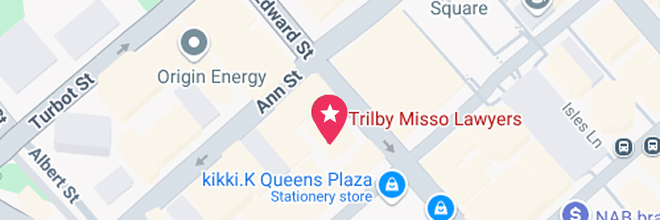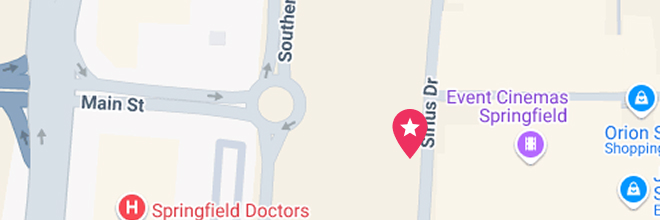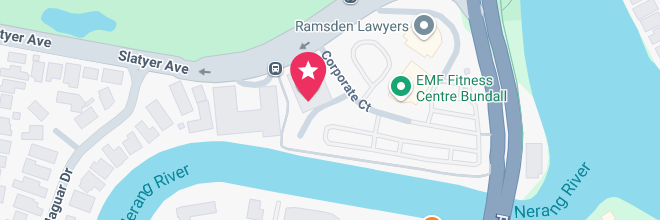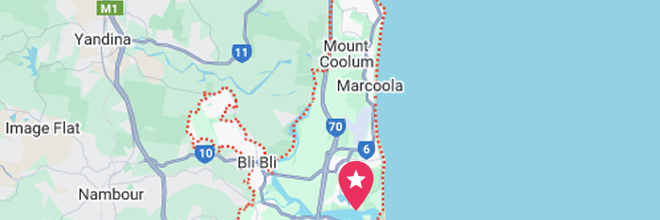Table of Contents
- Trilby Misso: A capable personal injury lawyer in Mackay
- Why choose Trilby Misso as your personal injury lawyer in Mackay?
- Mackay’s key features
- Mackay’s demographics
- Mackay’s historical background
- Mackay’s key attractions
- Mackay’s micro-economy
- Education and healthcare in Mackay
- Links for further reading
Visit Our Mackay Office
- Suite 2, 52 Macalister Street, Mackay QLD 4740
- Monday-Friday 8:30am to 5pm
- (07) 4881 0300
 Mackay’s key features
Mackay’s key features
Mackay is a vibrant regional city known for its picturesque landscapes and proximity to the Great Barrier Reef. It lies about 970 kilometres north of Brisbane, nestled between the Coral Sea and the lush hinterland. Mackay is strategically positioned near the mouth of the Pioneer River, one of its most defining geographical features.
The city is surrounded by a variety of natural landmarks that contribute to its scenic charm. In addition to the Pioneer River, which flows through the heart of the city, the region is also home to the expansive Eungella National Park, located in the hinterland to the west. Eungella is renowned for its rainforest-clad mountains and is a popular spot for bushwalking, birdwatching, and viewing the elusive platypus. To the east, the Whitsunday Islands and the Great Barrier Reef lie offshore, offering world-class marine biodiversity and water activities such as diving and snorkelling.
With its combination of river systems, national parks, and proximity to the coast, Mackay is a region of significant environmental diversity, making it an appealing destination for nature lovers and outdoor enthusiasts. Its climate and natural features support a variety of activities, from hiking and wildlife spotting in the hinterlands to enjoying the coastal waters.
 Mackay’s demographics
Mackay’s demographics
Mackay is a growing regional city with a population of around 125,000 residents. The city has experienced steady population growth, largely driven by its thriving industries such as mining, agriculture, and tourism. Mackay’s demographic profile reflects a younger and family-oriented population, with a median age of approximately 37 years, slightly younger than the national average.
The region has a diverse cultural background, with most residents being of Australian or European descent. However, Mackay has seen increasing numbers of residents from other cultures, particularly as a result of its growing economy and demand for workers in various sectors. There is a notable population of Indigenous Australians in the area, contributing to the city’s cultural richness. Recent migrants from countries such as New Zealand, the Philippines, India, and the Pacific Islands also play an important role in the workforce and community.
The Mackay lifestyle is characterised by its strong sense of community and focus on family-oriented activities. The city offers a laid-back coastal lifestyle with easy access to both urban conveniences and natural attractions. Residents enjoy a range of recreational opportunities, from beach activities and water sports to exploring nearby national parks. Mackay also hosts a variety of community events and festivals that celebrate its cultural diversity and agricultural heritage, such as the Mackay Festival of Arts and the annual Mackay Show.
Community facilities, including schools, sports clubs, and healthcare services, are well-established, making Mackay an attractive location for families. The cost of living is lower than in larger cities like Brisbane, contributing to a more relaxed and affordable lifestyle. Overall, Mackay’s demographic profile highlights a blend of traditional Australian values, cultural diversity, and a vibrant, family-friendly community atmosphere.
 Mackay’s historical background
Mackay’s historical background
Mackay’s was originally inhabited by the Indigenous Yuwibara people. They lived in the area now known as Mackay, making use of the rich resources provided by the coastal waters and surrounding forests. Their connection to the land remains a significant aspect of the region’s cultural heritage.
European exploration of the area began in the early 19th century. In 1860, the Scottish explorer John Mackay led an expedition through the region and discovered the fertile Pioneer Valley. Two years later, Mackay returned with a group of settlers and established a small pastoral community. The city itself was named in honour of John Mackay and grew from this early settlement.
Mackay’s development in the late 19th and early 20th centuries was driven largely by the booming sugarcane industry. The rich volcanic soil of the region made it ideal for sugarcane farming, which became the backbone of the local economy. Sugar mills were established, and the city became a major hub for sugar production in Queensland. The construction of railways in the late 1800s facilitated the transport of sugar, helping the industry expand even further.
As Mackay continued to grow, the city diversified its economy beyond agriculture. In the mid-20th century, mining, particularly coal mining in the nearby Bowen Basin, became a significant contributor to the regional economy. The development of the Port of Hay Point, one of the largest coal export ports in the world, reinforced Mackay’s role as an industrial centre.
 Mackay’s key attractions
Mackay’s key attractions
Mackay offers a variety of attractions and activities that cater to tourists and locals alike, blending natural beauty with cultural experiences. One of the region’s most popular natural attractions is the Bluewater Lagoon, a free water park located in the heart of Mackay, perfect for families looking to cool off and enjoy a day out. It features three-tiered swimming lagoons and water slides, making it a hit with children and adults alike.
Nature lovers often head to Eungella National Park, one of the most significant subtropical rainforests in Australia. Located just outside Mackay, it offers opportunities for hiking, birdwatching, and spotting wildlife, including the elusive platypus. The park’s Sky Window lookout provides panoramic views of the Pioneer Valley, making it a must-visit spot.
For those interested in cultural experiences, Artspace Mackay is the city’s premier art gallery, hosting rotating exhibitions of local, national, and international artists. The Mackay Regional Botanic Gardens is another serene destination, featuring native plants, walking paths, and a café overlooking the lagoon. The gardens also host various community events, making it a social hub for locals and visitors.
Mackay’s Bluewater Trail is a popular attraction for outdoor enthusiasts. It is a 20-kilometre pathway that winds along the Pioneer River, passing through parks, wetlands, and recreational areas. The trail is ideal for walking, cycling, or having a leisurely picnic.
Throughout the year, Mackay hosts several festivals, including the Mackay Festival of Arts, which celebrates the region’s creative talent through performances, visual art, and food events. River Sessions Music Festival is another major event, drawing music lovers from across the state.
From shopping and dining at the Caneland Central shopping centre to exploring nearby beaches like Harbour Beach, Mackay offers a range of activities that cater to families, adventure seekers, and those looking for a relaxed getaway.
 Mackay’s micro-economy
Mackay’s micro-economy
Mackay’s economy is diverse and robust, driven by several key industries that provide employment and fuel the region’s growth. Historically, sugarcane farming has been a foundational sector, with the region producing a significant portion of Queensland’s sugar. The fertile soil and favourable climate make Mackay a major hub for sugar production, with several sugar mills still in operation today.
The most significant driver of Mackay’s economy in recent decades has been the mining industry, particularly coal mining. Located near the Bowen Basin, one of the richest coal reserves in Australia, Mackay serves as a major service centre for the mining sector. The city supports mining operations through equipment manufacturing, maintenance, and logistics, with the Port of Hay Point playing a crucial role in exporting coal internationally. This industry provides high-paying jobs and has contributed to the region’s rapid economic growth.
In addition to mining and agriculture, the tourism sector is also vital to Mackay’s economy. With its proximity to the Whitsunday Islands, the Great Barrier Reef, and national parks, the region attracts both domestic and international tourists. Tourism supports local businesses, including hotels, restaurants, and tour operators, and has fostered growth in eco-tourism and cultural experiences.
Economic development trends in Mackay focus on diversification. While mining remains a dominant industry, efforts are being made to expand other sectors, such as education, healthcare, and construction. The local government actively promotes infrastructure development, including roads, ports, and digital connectivity, to support continued growth.
Mackay also has a thriving small business and entrepreneurship scene, with a strong network of local businesses ranging from retail and hospitality to manufacturing and technology services. Organisations such as Mackay Region Chamber of Commerce and government programs provide support and resources for startups, fostering innovation and encouraging new business ventures across various sectors.
 Education and healthcare in Mackay
Education and healthcare in Mackay
Mackay provides a range of educational and healthcare facilities, making it a well-serviced region for residents and surrounding communities. The city is home to numerous primary and secondary schools, both public and private, offering quality education to students. Prominent secondary schools include Mackay State High School, Holy Spirit College, and Whitsunday Anglican School, which offer diverse curriculums and co-curricular activities. These schools focus on both academic achievement and vocational education, preparing students for various pathways post-graduation.
For higher education, Mackay hosts a campus of Central Queensland University (CQU), one of the largest universities in the region. The CQU Mackay campus offers a variety of undergraduate and postgraduate programs in fields like engineering, business, health sciences, and education. The university is also known for its strong links to the mining and resources sector, providing industry-relevant courses and research opportunities. Additionally, TAFE Queensland operates in Mackay, offering vocational training and apprenticeships in a wide range of industries, including trades, healthcare, and business.
Mackay’s healthcare system is well-developed, with several public and private hospitals serving the region. The Mackay Base Hospital is the primary public healthcare facility, offering emergency care, surgical services, maternity care, and specialised health services. It is one of the largest regional hospitals in Queensland and has undergone significant upgrades to improve patient care. For private healthcare, the Mater Private Hospital Mackay provides a range of services, including surgical procedures, maternity care, and rehabilitation.
Mackay’s public services include mental health support, family and youth services, and aged care facilities, ensuring comprehensive healthcare and support for all age groups in the community. These services contribute to the overall well-being of the city’s residents.
Here’s how our ‘no win no fee’ process works:
-
We chat
 It’s a free consultation.
It’s a free consultation. -
We meet
 A free detailed discussion.
A free detailed discussion. -
We plan
 You say ‘go’ – we build your case.
You say ‘go’ – we build your case. -
We lodge
 We present
We present
your case. -
We conclude
 We reach a settlement.
We reach a settlement.
You pay nothing until you win
We’ll also provide certainty and clarity, with a fair structure that has no ‘uplift’ fee, ever. You’ll pay nothing ‘til your claim is won.
Don’t delay. Speak with Trilby Misso today.
Your next step is a small one. All you need to do is give us a call on 1300 731 671 or complete this form here to arrange a quick chat.
During this initial conversation, we will:
- Have a chat about the circumstances and nature of your injury.
- Give you an indication of your eligibility to make a claim for compensation.
- Explain, in simple terms, how our process works. We will answer
any questions you have about fees, the legal process, and anything else you’re unsure about relating to your injury.
We understand that taking legal action can be stressful, and we’ll do all we can to ease your concerns.
The chat can take place at our place, your place, or by phone. There is no cost, no pressure, and no obligation.

Call 1300 731 671 or fill out this form, and we’ll get back to you within 2 hours (during business hours). We look forward to meeting you.






